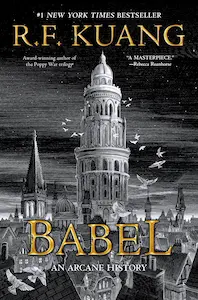Babel - Summary
R.F. Kuang

Introduction
In the fantasy novel “Babel” by R.F. Kuang, readers are transported to a world filled with magic, political intrigue, and the complexities of war. Set in a richly imagined universe inspired by Asian history and mythology, this gripping tale follows the journey of a young warrior as she navigates the treacherous landscape of power and revenge. With its compelling characters, intricate plot, and thought-provoking themes, “Babel” captivates readers from start to finish.
The World of “Babel”
Kuang masterfully constructs a world that is both familiar and fantastical. The story takes place in the fictional land of Nikan, a nation heavily influenced by Chinese history and culture. The author’s meticulous attention to detail brings this world to life, immersing readers in its vibrant cities, lush landscapes, and ancient traditions. From the bustling streets of the capital city to the remote villages nestled among mountains, every setting feels vivid and authentic.
The Protagonist’s Journey
At the heart of “Babel” is Rin, a young orphan girl who discovers her extraordinary power to wield the mythical Phoenix god’s power. Determined to escape her impoverished life, Rin enrolls in the prestigious Sinegard Academy, where she trains to become a warrior. However, her dreams of a better future are quickly shattered as she becomes entangled in a brutal war against the neighboring Federation of Mugen.
The Themes of Power and Revenge
One of the central themes explored in “Babel” is the corrupting nature of power. As Rin gains more control over her abilities, she finds herself tempted by the allure of strength and dominance. Kuang skillfully delves into the psychological complexities of power, highlighting its potential to both empower and destroy. Through Rin’s journey, readers are forced to question the ethical implications of seeking power at any cost.
Revenge is another prominent theme in the novel. Driven by a desire to avenge the atrocities committed against her people, Rin becomes consumed by her quest for vengeance. Kuang explores the destructive consequences of revenge, painting a nuanced portrait of a protagonist torn between her desire for justice and the toll it takes on her own humanity.
Complex Characters and Relationships
Kuang’s characters are multi-dimensional and captivating, each with their own motivations and flaws. Rin, in particular, undergoes a remarkable transformation throughout the story, evolving from an innocent girl into a hardened warrior. Her internal struggles and external conflicts make her a compelling protagonist, and readers will find themselves invested in her journey.
The relationships between characters also play a crucial role in “Babel.” From Rin’s complicated friendship with her fellow students at Sinegard Academy to her tumultuous alliances with political figures, the dynamics between characters add depth and complexity to the narrative. Kuang skillfully explores themes of loyalty, betrayal, and sacrifice, creating a web of relationships that keeps readers engaged and invested in the story.
Political Intrigue and War
The world of “Babel” is rife with political intrigue and power struggles. As Rin becomes entangled in the war against Mugen, she is forced to navigate a treacherous landscape of shifting alliances and hidden agendas. Kuang expertly weaves together elements of war strategy, diplomacy, and espionage, creating a gripping narrative that keeps readers on the edge of their seats. The author’s exploration of the consequences of war and the sacrifices it demands adds depth and realism to the story.
The Role of Mythology and Magic
Mythology and magic are integral to the world of “Babel.” Kuang draws inspiration from various Asian mythologies, infusing the story with a sense of wonder and enchantment. The mythical creatures, gods, and legends that populate the narrative add richness and depth to the world-building. Additionally, the magic system in “Babel” is intricately developed, with different schools of magic and unique abilities. The exploration of the limitations and consequences of magic adds an extra layer of complexity to the story.
Conclusion
“Babel” by R.F. Kuang is a captivating and thought-provoking novel that transports readers to a world of magic, political intrigue, and war. Through its compelling characters, intricate plot, and exploration of themes such as power, revenge, and sacrifice, the book offers a rich and immersive reading experience. Kuang’s masterful storytelling and attention to detail make “Babel” a must-read for fans of fantasy and those seeking a thought-provoking narrative.